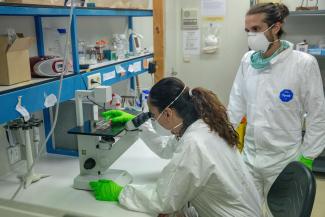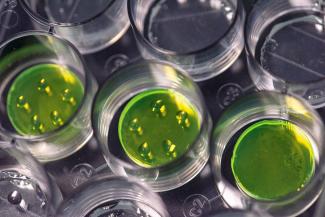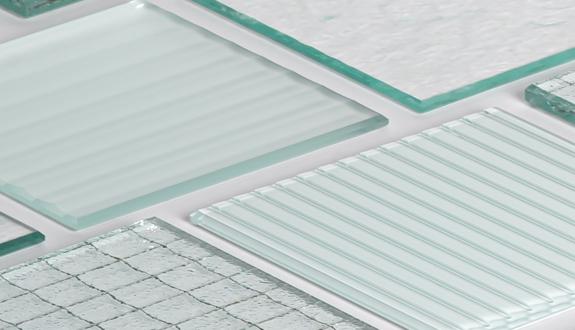Planibel Easy glass helps to reduce Covid-19 contamination when exposed to daylight
The latest glass technologies are making buildings, spaces and objects stronger, safer and healthier. Glass is a versatile material, ideal for maintaining a sanitised living environment. AGC Glass Europe continues its pursuit of solutions to protect our health and preserve our society. Faced with the worldwide Covid-19 crisis, AGC Glass Europe now has good news to share about coated glass that helps to protect against Covid-19 contamination.
Tested and verified by universities and laboratories
Respiratory droplets and aerosols contaminated with SARS-CoV-2 viral particles represent a risk of indirect transmission of COVID-19. Infectious droplets on surfaces see their viral infectiousness decreasing with time, depending on the type of material and temperature.
A study(1) published in the Coatings Journal with support from AGC was done on different materials ranging from metallic materials to float glass, acrylic glass (such as Plexiglas®, Perspex® etc.) and coated glass (Planibel Easy). The result shows the time taken for the number of infectious viral particles TCID50 (2) to decrease, and demonstrates that SARS-CoV-2 viral particles stay active for a shorter time on Planibel Easy coated glass previously exposed to daylight (photocatalytic effect). The study was carried out in an experimental setting that mimicked real-life conditions, under the responsibility of Prof. Muylkens(3) of the University of Namur (Belgium) and confirmed by Prof. Lucet(4-5), Dr Visseaux(4-6) and Dr Jérémie Guedj(4) of INSERM / Assistance Publique-Hôpitaux de Paris (France). The study used real human SARS-Co-2 viral particles at same concentration as the actual viral load observed in a cohort of patients infected with Covid-19.
The time needed to inactivate 90% of the SARS-Cov-2 viral particles is 37.5% shorter for Planibel Easy exposed to daylight than for float glass or acrylic glass. This means that using Planibel Easy greatly reduces the risk of viral transmission when we touch the surface.
| Material | Half-life TCID50 (hours) |
Time to 90% decrease of TCID50 (Median, hours) |
|---|---|---|
| Planibel Easy exposed to daylight | 4.1 | 13.5 |
| Float glass Acrylic glass |
6.9 | 21.6 |
| Stainless steel | 3.5 | 11.9 |
| Aluminium | 2.3 | 7.3 |
This makes Planibel Easy the appropriate choice for windows, partition walls, doors and a wide variety of shared or frequently touched surfaces, for instance in commercial and public buildings, public transport, hospitals, schools, sports facilities, leisure facilities, the hospitality industry and so on.
Planibel Easy, easy-clean glass and much more
Independently tested and certified, Planibel Easy was already known for the self-cleaning properties of its coating. It has now been shown that when daylight activates the coating this accelerates the destruction of SARS-CoV-2 particles (the virus responsible for Covid-19) on its surface.
AGC and the university research teams wanted to find a quick and effective solution against the spread of the coronavirus. By disclosing the first results of this research on an existing product, AGC allows innovative glass processors to offer solutions at a reasonable cost, to move forward together towards a better and safer future.
Planibel Easy can be combined in double glazing with other AGC products such as low-E glass. Resistant to corrosion and chemical damage, Planibel Easy can be delivered in toughened, laminated, bent and processed forms, and even in insulating double or triple glazing. As long as the glass is exposed to daylight and/or UV(A) light there are plenty of possibilities to make your space a safer place.
With this new benefit Planibel Easy confirms AGC Glass Europe’s commitment to Health & Safety and is a socially responsible contribution to our society, making people's life better around the world every day.
For more information on the new properties of Planibel Easy, visit our website www.agc-yourglass.com
(1) “Survival of SARS-CoV-2 on non-porous materials in experimental setting representative of fomites” in Coatings Journal - https://www.mdpi.com/2079-6412/11/4/371
(2) TCID50: Median Tissue Culture Infectious Dose @ 50% - This represents a measure of number of infectious viral particle
(3) Namur Research Institute for Life Sciences (NARILIS), Molecular Virology, University of Namur, 61 rue de Bruxelles, 5000 Namur, Belgium
(4) Université de Paris, IAME, INSERM, Paris, France
(5) Infection Control Unit, Assistance Publique-Hôpitaux de Paris, Bichat-Claude Bernard University Hospital, Paris, France
(6) Virology, Assistance Publique-Hôpitaux de Paris, Bichat-Claude Bernard University Hospital, Paris, France
Share this page
AGC Glass Europe
Hugues Lefevre
Product Manager Health, Safety and Security Glass
Mobile: +32 (0) 499 547 502
Hugues.Lefevre@agc.com
AGC Glass Europe
Niels Schreuder
Public Affairs & Communication
Mobile: +32 497 621 595
Niels.Schreuder@agc.com
AGC Glass UK Ltd
Andrea Marston
Market Development & IBP Manager
Mob +44 (0) 7736 059 465
andrea.marston@agc.com
AGC Glass Europe, a European leader in flat glass
AGC Glass Europe produces, processes and markets flat glass for the construction industry (external glazing and interior decoration), car manufacture and other industrial sectors (transport, solar power and high-tech). It is the European branch of AGC, a world leader in flat glass. It has over 100 sites throughout Europe and employs around 13,000 employees.
More information on www.agc-glass.eu (corporate site), www.agc-yourglass.com (glass for the construction industry) and www.agc-automotive.com (for the automotive industry).



